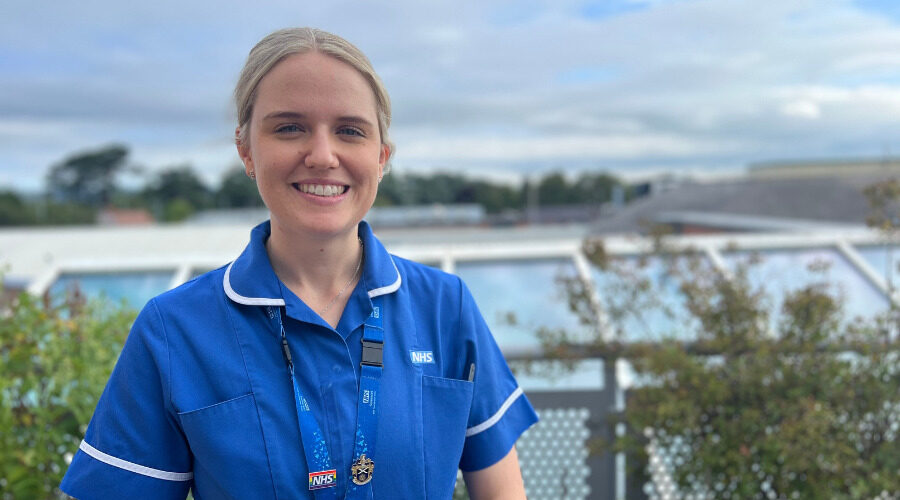
Spotlight
Shannon explores how to encourage careers in therapeutic radiography
Fewer people than ever are venturing into a career in therapeutic radiography, despite a sharp rise in the number of patients needing support from these specialists.
Our very own therapeutic radiographer Shannon Johnson is looking to see what can be done to reverse this trend, by setting up her own research study that looks at how young people could be persuaded to take up a career in radiography.
Shannon, who works in the Beacon Centre at Musgrove Park Hospital, has recently moved into a palliative specialist radiographer role as her main area of expertise.
“I feel really privileged to care for and treat this group of patients, who won’t have a cure for their cancer, so it’s all about working with them to maintain the best possible quality of life,” she said.
“We’ve certainly noticed that since the pandemic, we’re seeing a lot more poorly people coming through to us at the Beacon Centre, so my new role will be even more important as we move into the future.
“To be honest, outside of cancer care, I find that not many people really know what a therapeutic radiographer is, unless they, or a loved one, is in the situation where they need our support.
“When people talk about cancer, they tend to think of chemotherapy or surgery, but chemotherapy is actually used for about 16% of patients with cancer, whereas radiotherapy is used for between 40% and 50%.
“I’m a real advocate for what we do as therapeutic radiographers, as we work with really high-tech equipment and, most importantly, support our patients through difficult times.
“I’m very passionate about radiography as a profession, and it makes me feel quite sad that fewer people are considering taking this up as a career, so I want to do something about it.
“Spreading my knowledge of radiotherapy as a way to encourage people into the profession is something I’m passionate about, so beginning this research study felt like a natural step to take, as I know we simply don’t have enough therapeutic radiographers in the UK to care for the number of people who need treatment.
“I wished that when I was choosing my university options, someone would have told me about therapeutic radiography. As it is, I actually fell into the career by chance!
“Every time I tell someone outside the NHS about my job, they reply that working in cancer care must be really depressing, but it’s really not – it’s so rewarding as we can make such a difference. Therapeutic radiography is very much a hidden profession in that people don’t really know what we do.
“I now want to do everything I can to promote it, so members of the public are more aware of what to expect and generally how amazing this treatment is – it helps so many people!
“I applied and was accepted for a research grant from the Society and College of Radiographers, which allowed me to have some limited time away from work to focus on my research project – called ‘exploring radiographer therapeutic outreach in the UK.’
“First of all, I focused on gaining feedback from qualified professionals working within the field of radiotherapy via a series of surveys and questionnaires, where I asked how they felt we should change the way we recruit prospective students and encourage them to want to take up therapeutic radiography as a career.
“We’re looking specifically at the point of time when students make their choice of a university course, and what would entice them to get into the career. At the moment this tends to be through ‘clearing’ or having a family or friend in the profession – this is something I really want to change!
“I’ve had a great response to the surveys so far, which has made me feel really positive, as it genuinely feels like everyone wants the change.
“We now have a list of those barriers that stop people from choosing to study therapeutic radiography at university, which is really useful.
“My research is still ongoing and I’ve taken it to a couple of high profile events this year, including the Oncology Professional Care Conference and the UK Imaging and Oncology Conference – it was well received at both.
“Now we’re starting to get a picture of what’s stopping people from getting into the profession, we can change the way we reach out to young people. We also have apprenticeship schemes that bring in a bit more flexibility for people to study therapeutic radiography.
“I’ve already been going into colleges and secondary schools to give talks and showcase the therapeutic radiography profession, and this research gives us that platform – we’ll absolutely get there!”

